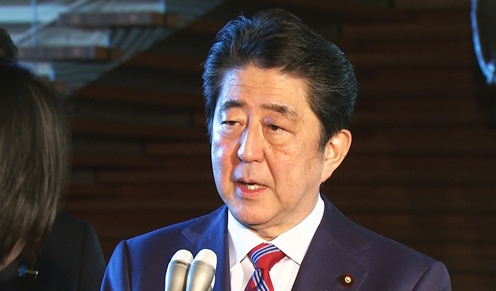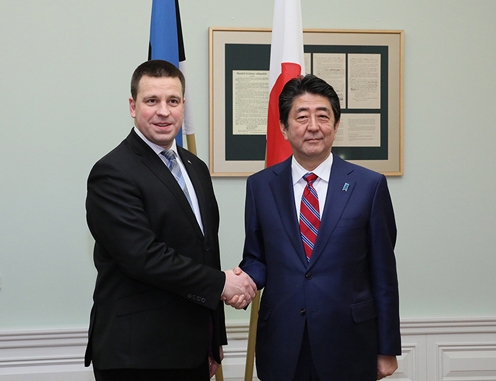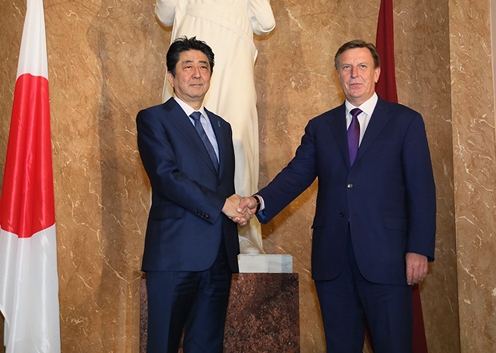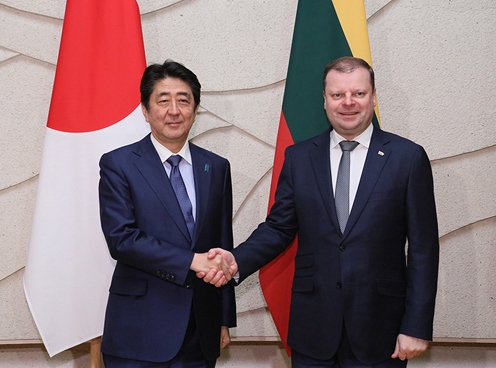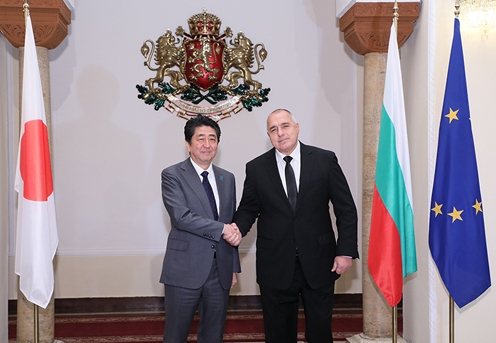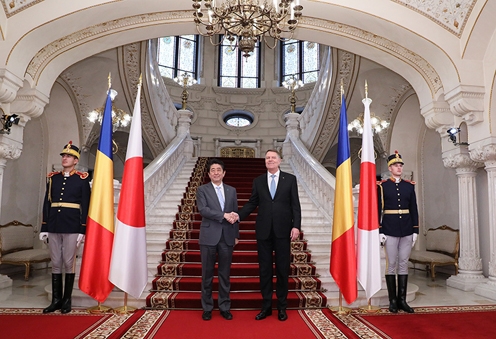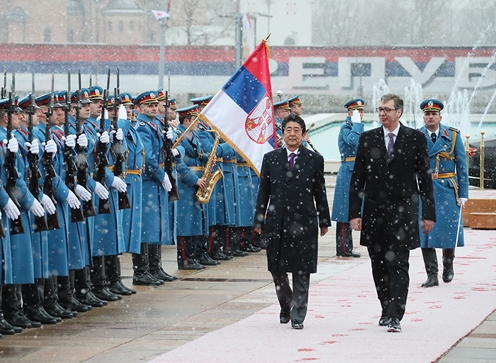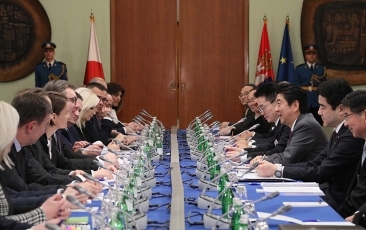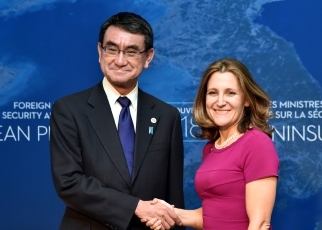Press Occasion on the Visit to Estonia, Latvia, Lithuania, Bulgaria, Serbia, and Romania, and the Japan-ROK Agreement
Cabinet Secretariat, Friday, January 12, 2018
[Provisional Translation]
On January 12, 2018, Prime Minister Shinzo Abe held a press occasion at the Prime Minister's Office.
In regard to the visit to Estonia, Latvia, Lithuania, Bulgaria, Serbia, and Romania as well as the Japan-ROK Agreement, the Prime Minister said,
“This will be the first time that a Japanese Prime Minister will visit these six countries. I believe this visit will broaden the scope of Japan’s diplomacy. During the summit meetings, I hope to confirm our collaboration on pressing issues faced by the international community, including the North Korean issues. I will also be accompanied on this visit by a business mission comprising over 30 companies. I would like to concretely promote economic relations with each country.
Concerning the Japan-Republic of Korea (ROK) Agreement (on the comfort woman issue), this is a promise between our two countries. It is an international and universal principle that such a promise should be upheld. We absolutely cannot accept the idea that the ROK would try to unilaterally seek further measures from Japan. Japan has been faithfully implementing everything we have promised. We will continue to strongly urge the ROK to implement the agreement as well."
Visit to Estonia
Cabinet Secretariat, Friday, January 12, 2018
[Provisional Translation]
On January 12, 2018 (local time), Prime Minister Shinzo Abe visited Tallinn in the Republic of Estonia.
Prime Minister Abe paid a courtesy call on H.E. Mrs. Kersti Kaljulaid, President of the Republic of Estonia . Following that, Prime Minister Abe held talks with H.E. Mr. Jüri Ratas, Prime Minister of the Republic of Estonia , and an expanded summit meeting with Japanese businesses. Afterwards, Prime Minister Abe held a joint press announcement.
In the evening, Prime Minister Abe attended a dinner hosted by Prime Minister Ratas.
Visit to Latvia
Cabinet Secretariat, Saturday, January 13, 2018
[Provisional Translation]
On January 13, 2018 (local time), Prime Minister Shinzo Abe visited Riga in the Republic of Latvia.
Prime Minister Abe held talks with H.E. Mr. Māris Kučinskis, Prime Minister of the Republic of Latvia , and then held a joint press announcement.
Following that, Prime Minister Abe visited the Freedom Monument, where he offered flowers. Later, Prime Minister Abe attended a lunch hosted by Prime Minister Kučinskis.
Visit to Lithuania
Cabinet Secretariat, Saturday, January 13, 2018
[Provisional Translation]
On January 13, 2018 (local time), Prime Minister Shinzo Abe visited Vilnius in the Republic of Lithuania.
Prime Minister Abe paid a courtesy call on H.E. Dr. Dalia Grybauskaite, President of the Republic of Lithuania. Following that, Prime Minister Abe held a meeting with H.E. Mr. Saulius Skvernelis, Prime Minister of the Republic of Lithuania, and an expanded summit meeting with Japanese businesses. Afterwards, Prime Minister Abe held a joint press announcement.
In the evening, Prime Minister Abe attended a dinner hosted by Prime Minister Skvernelis.
The following day on January 14 (local time), Prime Minister Abe visited Antakalnis Cemetery, where he offered flowers.
Later, he visited the Sugihara House in Kaunas.
After the visit, the Prime Minister said,
“I have received a very warm welcome from all the local people here, including the children. This certainly shows the feelings that the locals have about the courage of Mr. Chiune Sugihara.
In this land far from Japan, Mr. Sugihara worked as a Japanese diplomat under extremely difficult conditions with strong faith and determination to save the lives of many Jewish people.
During the dinner yesterday, a man seated far away walked across the room to speak with me. He is a Jewish member of the Seimas (the Parliament) of the Republic of Lithuania. He told me that tragically his mother’s visa did not arrive in time, and she was put into a concentration camp. Yet despite that, he said that he came to speak with me because he wanted to express his respect and gratitude for the courage and efforts of Mr. Sugihara.
Mr. Sugihara’s courageous and humanitarian activities are highly regarded all around the world. As a fellow Japanese person, I am enormously proud of his courageous and humanitarian actions.
I would like to express on behalf of Japan gratitude for the great care that everyone here is taking to preserve the memory of Mr. Sugihara, including the Japanese flag that flew over this building when it was the consulate.”
Visit to Bulgaria
Cabinet Secretariat, Sunday, January 14, 2018
[Provisional Translation]
On January 14, 2018 (local time), Prime Minister Shinzo Abe visited Sofia in the Republic of Bulgaria.
Prime Minister Abe held talks with H.E. Mr. Boyko Borissov, Prime Minister of the Republic of Bulgaria, and an expanded summit meeting with Japanese businesses. Following that, he held a joint press announcement.
In the evening, Prime Minister Abe attended a dinner hosted by Prime Minister Borissov.
On the following day, January 15 (local time), Prime Minister Abe paid a courtesy call on H.E. Mr. Rumen Radev, President of the Republic of Bulgaria.
Visit to Romania
Cabinet Secretariat, Tuesday, January 16, 2018
[Provisional Translation]
On January 16, 2018 (local time), Prime Minister Shinzo Abe visited Bucharest in Romania.
After visiting the Japanese garden and the National Village Museum, Prime Minister Abe held talks with H.E. Mr. Klaus Iohannis, President of Romania. Following that, he held a joint press announcement.
In the evening, Prime Minister Abe attended a dinner hosted by President Iohannis.
Visit to Serbia
Cabinet Secretariat, Monday, January 15, 2018
[Provisional Translation]
On January 15, 2018 (local time), Prime Minister Shinzo Abe visited Belgrade in the Republic of Serbia.
After attending the welcome ceremony, Prime Minister Abe held talks with H.E. Mr. Aleksandar Vučić, President of the Republic of Serbia, and an expanded summit meeting with Japanese businesses. Following that, he attended the signing ceremony, and held a joint press announcement.
In the evening, Prime Minister Abe attended a dinner hosted by President Vučić.
Japan-Serbia Summit Meeting
Foreign Affairs, Monday, January 15, 2018
On Monday, January 15, commencing at 3:50 p.m. (local time; 11:50 p.m. on Monday, January 15, Japan time) for approximately 60 minutes, Mr. Shinzo Abe, Prime Minister of Japan, held a Japan-Serbia Summit Meeting with H.E. Mr. Aleksandar Vučić, President of Serbia, during his visit to Serbia. The overview of the meeting is as follows.
1. Bilateral relations in general
(1) Prime Minister Abe stated that the relationship between the two countries has been steadily developing, and welcomed progress with the Flue Gas Desulphurization Project for Thermal Power Plant Nikola Tesla, which is Japan’s first yen loan to Serbia. Prime Minister Abe also mentioned the outcomes of the Japan External Trade Organization (JETRO) mission that Japan dispatched last year, and welcomed the signing of notes on an agreement to dispatch Japan Overseas Cooperation Volunteers (JOCV).
(2) In response, President Vučić explained that Serbia is preparing various preferential measures for foreign investment and has concluded free trade agreements (FTA) with various countries. President Vučić welcomed that Japanese companies are setting up businesses in Serbia due to the advantages it offers in terms of good access to major markets, and explained that he hopes to use this as an opportunity to further advance economic relationship between Japan and Serbia.
2. Cooperation between Japan and the Western Balkans
Prime Minister Abe stated that Japan will further enhance its cooperation with the Western Balkan region under the “Western Balkans Cooperation Initiative”. More specifically, Prime Minister Abe proposed (1) promoting dialogue by appointing the Ambassador in Charge of the Western Balkans at the Ministry of Foreign Affairs, (2) dispatching a Japan International Cooperation Agency (JICA) survey team to uncover new cooperation projects, and (3) holding seminars in order to promote regional cooperation. In response, President Vučić welcomed this Initiative.
3. Accession of Serbia to the European Union (EU)
Prime Minister Abe welcomed the steady progress with Serbia’s EU accession process, and stated that Japan will continue to support Serbia’s reform efforts. In response, President Vučić expressed gratitude for Japan’s support in connection with Serbia’s EU accession.
4. Kosovo
(1) Prime Minister Abe stated that he supports the EU-facilitated dialogue that Serbia is undertaking with Kosovo, and expects both sides play a constructive role in realizing the normalization of relations between Serbia and Kosovo.
(2) In response, H.E. Mr. Ivica Dacic, First Deputy Prime Minister and Minister of Foreign Affairs of Serbia, who was present at the meeting, explained Serbia’s position with regard to the Kosovo issue, and stated that Serbia will strive for peace and stability in the Western Balkan region.
5. North Korea
Prime Minister Abe explained that North Korea now poses a threat to all of Europe, including by launching ballistic missiles with a potential range as far as Belgrade, and explained that he hopes to work together with Serbia on various problems facing the international community, including North Korea issue.
The two leaders shared the view that in order to create a situation in which North Korea seeks dialogue after demonstrating concrete action on denuclearization, it will be necessary to use all means to maximize pressure. Prime Minister Abe requested understanding and cooperation on promptly resolving the abductions issue.
6. Other
Prime Minister Abe and President Vučić also exchanged views on cooperation in various international arenas and on international affairs, including Russia and China.
Japan-Canada Foreign Ministers’ Meeting
Foreign Affairs, Monday, January 15, 2018
On January 15, commencing at shortly after 6 p.m. (shortly after 11 a.m. on January 16, Japan time) for approximately 35 minutes, Mr. Taro Kono, Minister for Foreign Affairs, who is visiting Vancouver to attend a foreign ministers’ meeting on North Korea, held a Japan-Canada Foreign Ministers’ Meeting with the Honourable Christia Freeland, Minister of Foreign Affairs of Canada. The overview of the meeting is as follows.
At the beginning, Minister Freeland welcomed Minister Kono’s participation in this foreign ministers’ meeting on North Korea, and explained that she hopes to hold a close discussion on resolving the North Korea problem with the countries concerned, including Japan, at the meeting on the following day, January 16. Minister Kono expressed gratitude for the invitation to the meeting. The two foreign ministers shared recognition that it will be necessary to use the January 16 meeting to demonstrate the international community’s solidarity for maximizing pressure on North Korea.
In addition, the two foreign ministers exchanged views on the G7 Foreign Ministers’ Meeting and G7 Summit Meeting, which Canada will host as the holder of the G7 Presidency. Minister Kono explained that Japan will do its utmost to cooperate for the success of the meetings, and stated that he hopes to hold a robust discussion on regional affairs, including Asia, at the meetings. The two leaders shared the view that they will continue to coordinate closely.
World’s First*1 Test of Expressway Traveling of CACC*2 -mounted Trucks in a Caravan with Drivers in the Second and Following Trucks to be Launched
METI, Friday, January 12, 2018
The Ministry of Economy, Trade and Industry (METI) and the Ministry of Land, Infrastructure, Transport and Tourism (MLIT) have been advancing a project titled “Research and Development/Demonstration Project for Implementation of an Advanced Autonomous Driving System in Society.” As part of this effort, on January 23, 2018, they will launch a demonstration test of expressway traveling of trucks in a caravan in which the second and following trucks are driven by people, taking advantage of a CACC technology. This test will be conducted on part of the Shin Tomei Expressway between Hamamatsu Service Area (SA) and Enshu-morimachi Parking Area (PA).
Under the Future Strategy 2017 (approved by the Cabinet on June 9, 2017), METI and MLIT aim to commercialize expressway traveling of trucks in a caravan with unmanned driving of the second and following trucks in 2022 at the earliest possible time, which is one of the major goals for achieving the mobility revolution in Japan. To achieve this on an expressway, i.e., the Shin Tomei Expressway, in 2020, they have been advancing preparation for launching public-road demonstration tests of traveling of CACC-mounted trucks in a caravan with drivers in the second and following trucks by the end of FY2017 and traveling of trucks in a caravan with a system for unmanned driving of the second and following trucks, in which some drivers ride in the vehicles in case of an emergency.
In 2016, METI and MLIT held discussions concerning issues on inter-vehicle distances required to secure safety during public-road demonstration tests, and prepared a traveling plan in which specific roads and methods are stipulated.
In light of the results of past discussions, METI and MLIT decided to launch, on January 23, 2018, the world’s first expressway demonstration test of trucks, developed by four domestic manufacturers, in a caravan with drivers in the second and following trucks, as part of the project above.
Notes:
*1 This expressway traveling of trucks in a caravan with drivers in the second and following trucks, the trucks of which use a CACC technology jointly developed by multiple truck manufacturers and have been developed by four different truck manufacturers, is the world’s first effort.
*2 The term “CACC” is an abbreviation of “Cooperative Adaptive Cruise Control.” Using a communication means of the cooperative support system for keeping a predetermined inter-vehicle distance, the CACC function receives control information from a leading vehicle, automatically controls speed, and keeps the predetermined inter-vehicle distance.
Outline of the explanatory meeting at the test site
Date and time: January 23 (Tue.), 2018; from 11:00 a.m.
Venue: Temporary parking lot at Hamamatsu SA along a lane bound for Tokyo, Shin Tomei Expressway
Outline of program: Explanation of overview of the test, explanation of test trucks, etc.
Interview: If you wish to report on the test, see Appendix 2.

























